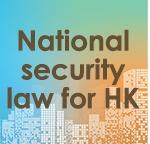The High Court on Friday ruled that the first person charged under the new National Security Law was legally detained.
High Court Judges Anderson Chow Ka-ming and Alex Lee Wan-tang dismissed an application for a writ of habeas corpus filed by Tong Ying-kit, the first person prosecuted under the National Security Law, which came into effect on June 30.
The defendant claimed in court he was being held unlawfully and asked that he should be released.
ALSO READ: HK court denies review over phone searches
Tong, 23, allegedly drove a motorcycle displaying a flag with the slogan "Liberate Hong Kong, Revolution of our times" and charged toward a police checkpoint on July 1. He was accused of inciting others to commit secession and committing terrorist activities causing or intended to cause societal harm.
On Aug 3, Tong applied for a writ of habeas corpus at the Court of First Instance. He had been remanded into custody since being arrested on July 1. Chief Magistrate So Wai-tak at the West Kowloon Magistrates' Court on July 6 refused to grant bail, and ordered him kept in custody until the next hearing scheduled for Oct 6.
Rejecting Tong's application against the judge's order, the High Court ruled that the remand order was lawful. The chief magistrate issued the order while exercising his ordinary judicial powers and "cannot be said to be without lawful authority", the High Court said.
According to Article 42 of the National Security Law, no bail shall be granted to a criminal suspect or defendant unless the judge has sufficient grounds for believing that the suspect or defendant will not continue to commit acts endangering national security.
ALSO READ: HK: More than 10 public figures held over illegal assemblies
The defendant's senior counsel, Philip Dykes argued that Article 42 "takes away the presumptive right to bail" because "to be bailed, the applicant must acknowledge he has already committed such acts, or the judge or magistrate must form a view the applicant had committed relevant acts and that he would not continue to commit them".
The High Court disagreed, saying Dykes' submission was an "unreasonable reading of the relevant article".
It accepted the submission of Barrister Benjamin Yu, who represented the SAR government, that the word "continue" in Article 42 merely means "for a continuing period, ie for the future if bail is granted".
The High Court also refuted the argument that chief magistrates are not "independent" as "they are selected and appointed by the Chief Executive".
ALSO READ: Ex-police chief: Training needed for new national security squad
Under the National Security Law, the Chief Executive does not assign or nominate any particular judge to hear any particular case and the task remains a matter for the judiciary to decide.
The High Court also said it was "obviously untenable" for Dykes to say that he Nationality Security Law is "inaccessible" because it was promulgated in the Chinese language.
"There is no law we are aware of which requires a national law promulgated in the Chinese language to be accompanied by an authentic English text," the High Court said.
It also pointed out Tong can retain a suitable and appropriate barrister to represent him in court. There is a large pool of competent senior counsels in Hong Kong who can read and understand Chinese, the High Court added.
READ MORE: HKSAR sets up conferences to explain National Security Law
Another hearing will be held on Tuesday to decide whether Tong should be granted bail.



